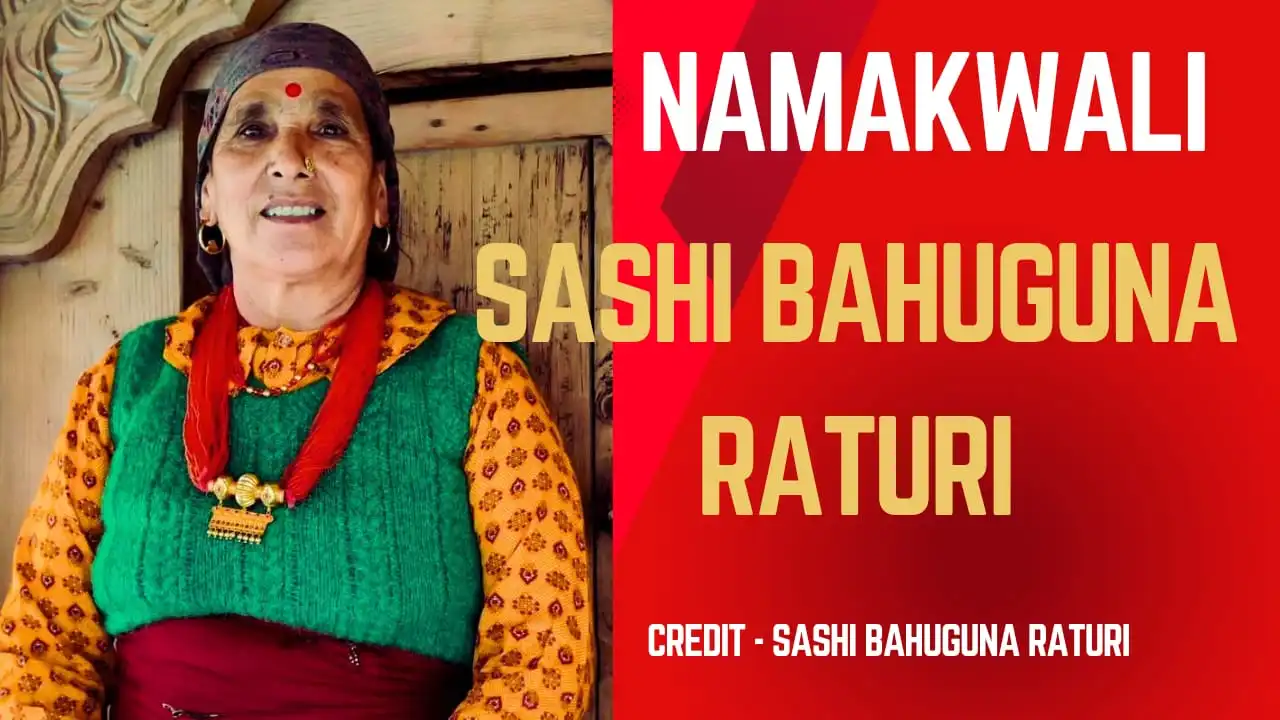Sashi Bahuguna Raturi
At the age of 52, Shashi Bahuguna Ratudi turned her long-held observation into a meaningful venture. Inspired by the women of her Himalayan community who prepared traditional flavored salt using manual stone grinders (silbatta), she set out to transform this local art into a sustainable business.
During her music practice sessions, women participants often shared their homemade flavored salts, each with a distinct taste. This inspired Shashi to create a brand that could share these organic, handcrafted salts with a wider audience while empowering women to earn independently. Thus began the journey to convert a rooted tradition into a platform for women’s employment and self-reliance.
Who is the founder of Namakwali?
Sashi Bahuguna Raturi: In March 2018, Sashi launched her startup with a humble investment of just ₹1,000. Her first product, a uniquely flavored salt called Pishu Loon, originated from Uttarakhand’s culinary traditions. The salt was innovatively packed using a mix of bamboo paper and plastic, ensuring both sustainability and product freshness.
The initial sales happened on Instagram and Facebook, where a small number of orders gradually turned into a steady customer stream. This digital-first approach allowed the brand to reach customers directly without requiring an elaborate retail setup.
Empowering Women and Supporting Farmers:
Namak Wali: Central to the business model was the idea of empowerment through participation. Local women were trained and employed to produce the flavored salt, turning what began as a single-woman effort into a livelihood source for 35 women.
To maintain authenticity, raw materials were sourced from organic Himalayan farms, supporting nearly 500 farmers who practiced chemical-free cultivation. This approach ensured sustainable sourcing while promoting the economic well-being of both women and farmers.
Sashi Bahuguna Raturi (Namak Wali):
Sakhi Bahuguna Raturi: Like many women entrepreneurs, Shashi faced skepticism and resistance in the beginning. Family members and community figures, particularly husbands, doubted that making and selling salt could ever sustain a household.
However, instead of discouragement, these doubts became her motivation. She remained confident in her vision of creating both a respected brand and a reliable source of income for women. Her perseverance transformed initial resistance into a story of triumph and inspiration.
Read More: Namak Wali Women Success Story (Credit: Joshtalks)
Namak Wali Brand Owner:
Namak Wali: The venture steadily evolved from a small local production unit into a scaled enterprise receiving hundreds of daily orders.
In 2020, Shashi formally registered her brand as “Namak Wali” (The Salt Lady)—a name that embodied both tradition and empowerment. With expanding demand, the business launched its own website and listed on Amazon, bringing Himalayan products to customers across the country and beyond.
Packaging and presentation became integral parts of the brand’s identity, designed to maintain authenticity while appealing to modern consumers.
Namak Wali Business Model:
Sashi Bahuguna Raturi (Namak Wali) What truly set Namak Wali apart was its emotional connection with customers. Buyers saw themselves as part of a growing community, returning repeatedly not just for the product but for its story and purpose.
To match this social impact, the enterprise also practiced eco-consciousness by planting a tree for every purchase—merging environmental care with commercial growth.
Namak Wali: Shark Tank India Success
Sashi Bahuguna Raturi: A defining moment came in 2023, when Namak Wali appeared on Shark Tank India. Shashi secured a ₹50 lakh investment deal from entrepreneur Amit Jain, giving the brand nationwide visibility.
Post-show, the company experienced a rapid sales surge that tested its systems and manpower. Through focused team effort and operational restructuring, the challenges of over-demand and stock shortages were successfully managed.
Namak Wali Net Worth:
Today, Namak Wali boasts an impressive turnover of ₹5 crore. It directly supports 35 women artisans and 500 farmers, connecting rural livelihoods with urban marketplaces.
The brand’s portfolio has also diversified, now offering organic garlic, ginger, coriander, and cow ghee alongside its signature flavored salts. Products are available online and in select premium hotels, symbolizing quality and purpose.
Namak Wali Success Story:
-
Age and Experience Are No Barriers: Starting at 52, Shashi has proven that passion and clarity of vision matter more than age.
-
Tradition Meets Modern Enterprise: By combining indigenous recipes with digital branding, she turned local craftsmanship into a profitable, scalable business.
-
Women’s Empowerment Through Work: Steady employment for women promotes self-worth, household stability, and preservation of traditional skills.
-
Digital Platforms Drive Growth: Social media and e-commerce empowered the business to grow rapidly without heavy infrastructure costs.
-
Confidence Beats Skepticism: Shashi’s persistence against social resistance stands as a model for aspiring women entrepreneurs.
-
Quality Builds Loyalty: Maintaining purity, hygiene, and attractive packaging earned the brand repeat customers.
-
Visibility Accelerates Growth: The Shark Tank appearance showed how media exposure can amplify business opportunities.
-
Structured Scaling Is Vital: Managing operations effectively during expansion ensures long-term stability.
Conclusion
Sashi Bahuguna Raturi (Namak Wali) is more than a brand—it’s a movement of empowerment, resilience, and tradition. From a modest beginning with ₹1,000 to a multimillion-rupee enterprise, Shashi Bahuguna Ratudi’s journey demonstrates that determination, authenticity, and purpose-driven innovation can turn even the simplest ideas into a force for social and economic change.
Her story is a living testament to how one woman’s vision can uplift an entire community and inspire countless others to believe in the power of change.
Read More: The story of Bihar’s Punita Kumari
